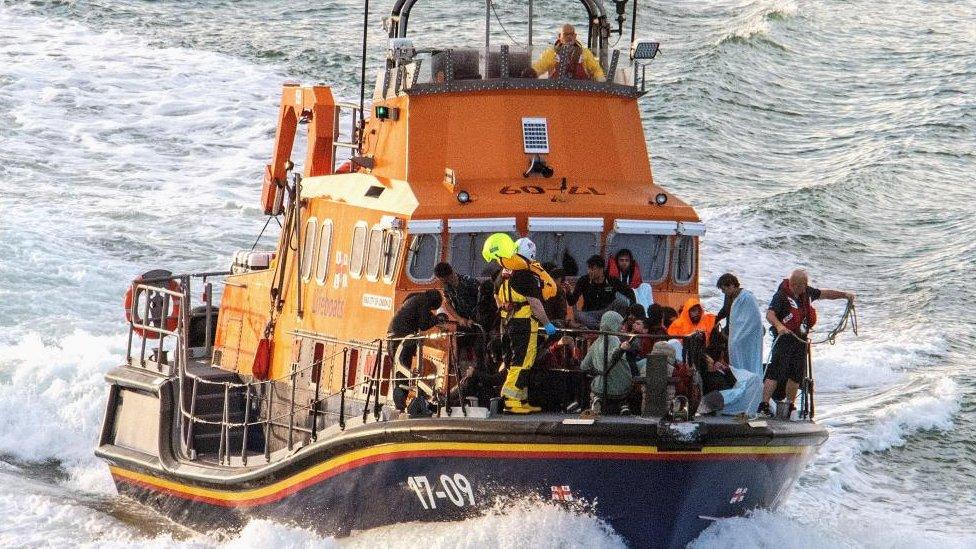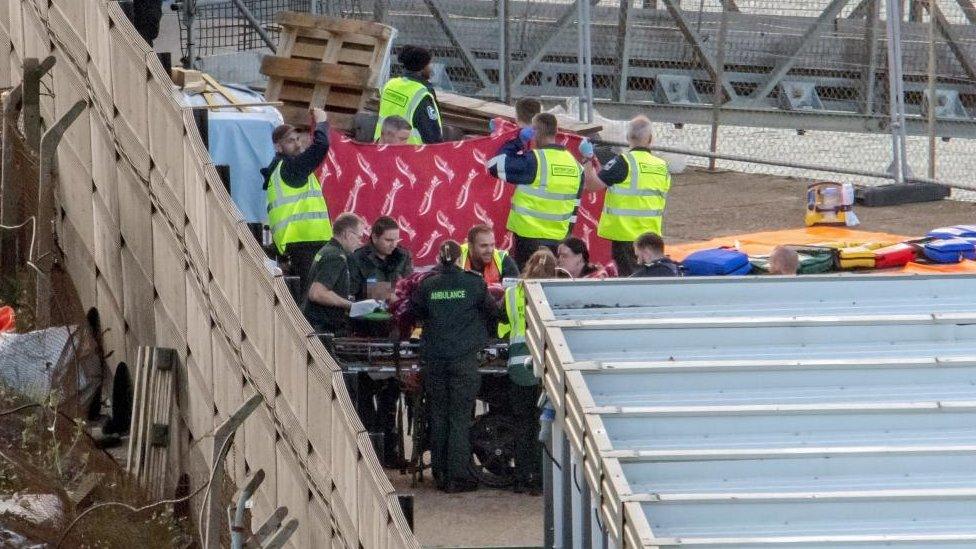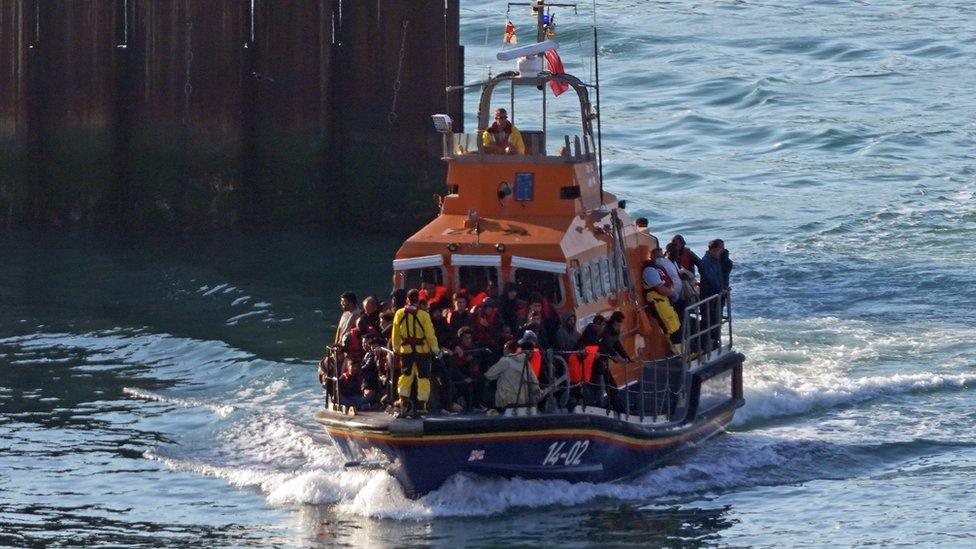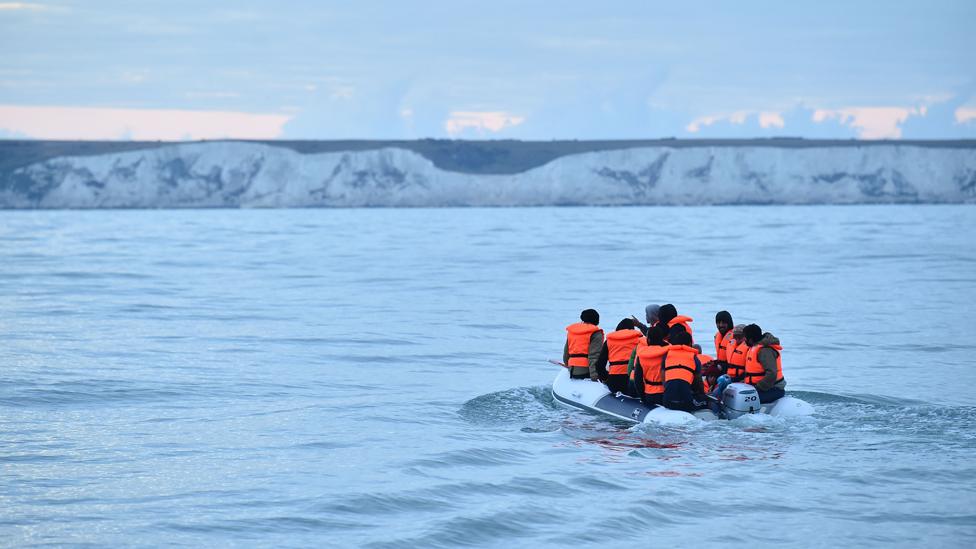Migrant boat sinks in Channel killing six people
- Published

Six people have died after a boat carrying migrants sank in the Channel, off the French coast.
The French coast guard said the vessel got into difficulty in the sea near Calais in the early hours of Saturday.
Fifty-nine people - many of them Afghans - were rescued by French and British coastguards, officials said. But the search for two people who may still be missing has been called off.
Some people were seen being brought off a lifeboat in Dover on stretchers.
The extent of injuries remain unclear and the exact numbers of those rescued changed during the day as more information was released.
The six people who died were Afghan men thought to be in their 30s, the AFP news agency reported Philippe Sabatier, deputy public prosecutor for the French coastal city of Boulogne, as saying.
He said those rescued included some children and were mostly from Afghanistan, although there were some Sudanese.
The French coastal authority Premar said a passing ship first raised the alarm at around 04:20 local time that an overloaded boat was in difficulty off the coast of Sangatte.
When the French lifeboat arrived, they found people in the sea, with some screaming for help.
The Dover lifeboat, which was already in the Channel dealing with another boat carrying migrants, joined the rescue operation at 05:50.
One of the volunteer rescuers told the Reuters news agency migrants were using shoes to bail water out of the sinking boat.
Anne Thorel said there had been "too many" people on board.
Another French rescuer, Jean-Pierre Finot, said: "Some were suffering from sea sickness and the boats are quite simply overloaded... [and] can no longer move forward".
Rescue crews say this is the seventh time this week that they have had to pull people from the water, raising concerns that the smugglers organising the crossings may be using a defective batch of boats.
In its latest update, French officials said interviews with survivors suggest 65 or 66 people were on the boat. Often boats are so overloaded it is difficult to tell how many people are on them.
Premar said 23 people were taken to Dover by UK rescue crews and a French boat took 36 to Calais.
Two French boats were still searching for the two people who could still be missing, it added.
A French Navy aircraft and a helicopter had been deployed to help the search.
The MP for Calais, Pierre-Henri Dumont, said authorities are interviewing the migrants who are able to speak and not too unwell, to establish what happened and where they are from.
Although the incident happened in French territory, with these types of operations, British and French rescue teams work together to rescue as many people as possible.

Enver Solomon, chief executive of the Refugee Council, thanked the rescuers for their efforts but urged the UK government to work on creating an "orderly and humane asylum system".
The English Channel is one of the most dangerous and busiest shipping lanes in the world, with 600 tankers and 200 ferries passing through it every day.
Home Secretary Suella Braverman called what happened a "tragic loss of life".
A UK government spokesperson said the deaths were "devastating and our thoughts are with the victims' families and friends at this time".
They added: "This incident is sadly another reminder of the extreme dangers of crossing the Channel in small boats and how vital it is that we break the people smugglers' business model and stop the boats."

People were seen being brought ashore on stretchers at Dover, for medical treatment
Dover MP, Natalie Elphicke, said the incident highlighted the need for joint patrols on the French coast.
"These overcrowded and unseaworthy death traps should obviously be stopped by the French authorities from leaving the French coast in the first place," she said.
On X, formerly known as Twitter, shadow immigration minister Stephen Kinnock said it was an "appalling, deeply shocking tragedy".
Another small boat also got into difficulty on Saturday but all on board were rescued, the UK Coastguard said.
Meanwhile, people from other migrant boats that had made successful crossings could be seen being brought ashore at Dover during the day.
In the last two days more than 1,000 people made the journey across the Channel to the UK, government figures show., external More than 100,000 migrants have crossed in small boats since 2018.
At least 27 migrants died after a dinghy sank while heading to the UK from France in November 2021, the highest recorded number of deaths from a single incident.
Four people died at sea while trying to cross in December 2022.
The incident comes after the UK government faces pressure over fears of a Legionella outbreak on its new migrant barge, Bibby Stockholm, moored in Portland Port, Dorset. The first migrants to board the vessel had to be removed after bacteria was found in the water system.


Today's tragedy is a reminder of one thing that unites all parties when it comes to immigration policy at the moment - nobody wants people making the very dangerous route across the channel in small boats.
But people still are, and in great numbers.
The government is insisting it wants to push on with its plans to house some asylum seekers on barges like the Bibby Stockholm - and with its plans to send some asylum seekers to Rwanda, which is still subject to legal challenge.
Two of its flagship policies are currently stalled. But the bigger overarching question for ministers, yet to be established, is will they work?
And will, as ministers suggest, reducing the "pull factors" be enough to stop people from making this dangerous journey when some are already not deterred by the very real risk of harm?

Related topics
- Published11 August 2023

